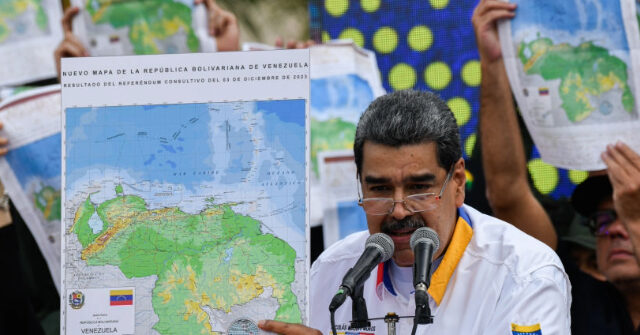Top News
Venezuela Issues Threatening Demand for Guyana to Stop ExxonMobil from Drilling in Its Waters

Venezuela’s socialist regime once again threatened neighboring Guyana on Sunday if American oil company ExxonMobil executed its plan to drill oil in the waters near the Essequibo contested territory.
The Essequibo represents two-thirds of the area of Guyana. Venezuela has claimed it for itself for more than 120 years.
Dictator Nicolás Maduro’s regime, via its Foreign Ministry, issued a statement on Sunday denouncing a purported “malicious campaign prepared and financed by ExxonMobil” and allegedly backed by Guyana against Venezuela’s constitutional obligation “to establish a complete policy, in the land, insular and maritime border areas, to preserve, through the Bolivarian National Armed Forces, its territorial integrity, national sovereignty and the defense of the Homeland.”
#Comunicado | Venezuela denuncia maliciosa campaña de la Exxon Mobil en su contra secundada por Guyana ⬇️https://t.co/hIdS4fNson
#VenezuelaAvanzaFeliz pic.twitter.com/TWylPSCB0j
— Cancillería Venezuela 🇻 (@CancilleriaVE) February 11, 2024
Venezuela “reserves its right to diplomatic actions, and all those enumerated in international law, to make all the rights that belong to it count,” the statement asserted.
Maduro issued the threat days after ExxonMobil announced its intention to conduct an offshore exploration in Essequibo’s waters in search of oil. Alistair Routledge, the head of ExxonMobil in Guyana, reportedly asserted that the planned exploratory drilling would be “well south” of the contested territory.
According to local media, the area where the planned offshore oil exploration drilling will take place is the same area where the Maduro regime deployed its navy to threaten ExxonMobil in December 2018, preventing a planned oil exploration venture at the time.
The Maduro regime’s statement continued by accusing Routledge of “substituting” his own authority for Guyana’s sovereignty and “dar[ing] to issue threatening judgments, rejoicing at the presence of military powers in an undelimited sea, where they have received illegal oil concessions, some of them located in an incontrovertibly Venezuelan maritime area.”
The statement read:
Venezuela makes it clear to the Community of Latin American and Caribbean States that the actions of Exxonmobil and the Government of Guyana contravene the fundamental principles of international law and constitute an aggression that seeks to destabilize the region.
Venezuela began arguing that the Essequibo should be part of its territory when it gained independence from Spain in 1811, almost 190 years before the arrival to power of the ruling socialist regime.
In 1899, an arbitration process held in Paris defined the current borders of the two countries. Venezuela has historically denounced that process as fraudulent. Then, in 1966, a new agreement was reached months before Guyana, at the time known as British Guiana, gained its independence from the United Kingdom.
The 1966 agreement established that Guyana was to administer the contested territory until an unspecified permanent solution was found. No such solution has arrived at press time.
The Maduro regime reignited the dispute with hostilities against Guyana after the neighboring nation began discovering oil and gas in the contested region in 2015. The latest breakthrough was announced in October.
Maduro responded to the discovery by launching a widespread campaign to “annex” the contested territory spearheaded by a sham referendum that “asked” the Venezuelan electorate to approve annexation.
The election, widespread media and observer reports concluded, was marked by an extremely low voter turnout and near barren electoral centers. The Maduro regime made the ludicrous claim that more than ten million votes were cast in favor of annexing the Essequibo region, serving as the “mandate” to immediately begin to draft plans to annex the region. The annexation began with Maduro granting Venezuelan identity documents to Essequibo’s mostly indigenous inhabitants.
The Center for Strategic and International Studies (CSIS) published satellite images Friday that suggest a growing expansion of Venezuela’s military presence in bordering areas with Guyana. The images, dated January, indicate that the Maduro regime has expanded nearby military bases and personnel in the region.
Venezuelan Defense Minister Vladimir Padrino López downplayed the concerns on Sunday, claiming that the military presence is of a “non-hostile” nature.
Read the full article here


















